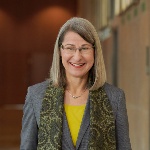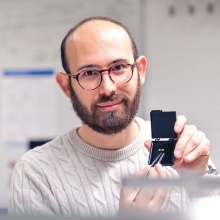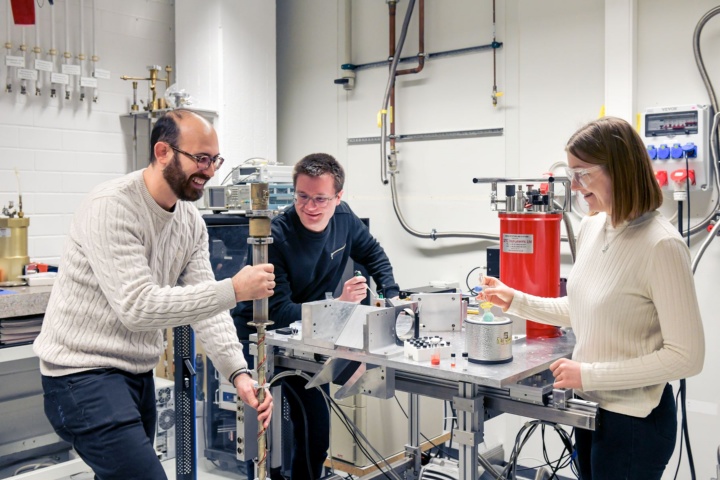Quantum computers are regarded as one of the next big sensations in science and industry. What the basic building blocks of technically mature computers, the qubits, will consist of in the future, is still a current research question. Dr. Lorenzo Tesi from the Institute of Physical Chemistry at the University of Stuttgart is investigating molecular spin qubits. The chemical scientist is establishing an Emmy Noether junior research group for the still young research topic.
“Molecular spin qubits have unique properties that cannot be found in any other known qubit materials. Molecules are very advantageous, in particular because of the high versatility offered by chemical synthesis”, says Lorenzo Tesi, scientist at the Institute of Physical Chemistry at the University of Stuttgart. “We want to tailor molecules that are suitable as qubits and study how they can be technically realized.” Unlike classical bits, qubits can exist not only in the states 0 and 1, but also in any superposition of these two states, allowing a much higher density of information. In order to be able to use them for computation, a number of challenges need to be overcome. For example, they need to be carefully shielded from interference from the outside world, and we need to be able to manipulate the qubits individually. For example, superconducting circuits, trapped atoms, defects in diamonds – or molecules such as those investigated by Tesi – are suitable as qubits.
Scalable and energy-efficient
The research field of molecular spin qubits is relatively young, with the first work appearing less than 20 years ago. They are as insensitive to interference as the superconducting circuits, which are currently used to build the most technically advanced quantum computers. In contrast to superconducting circuits, however, molecular spin qubits do not need to be cooled down to a temperature of -273.14 °C. “They exhibit quantum properties over a wide range of temperatures, even at room temperature. This would save an enormous amount of energy”, Tesi points out. And there is another major advantage: While each superconducting circuit can represent only one qubit, several qubits can be realized with a single molecule. A system of many qubits should therefore be easier to scale using molecules than with superconducting circuits.
Researching properties of qubits
Tesi’s junior research group has three goals. The first is to deposit the qubits to surfaces and find out how their properties change as a result. So far, molecular spin qubits have mainly been studied in solution. Secondly, Tesi’s team wants to use terahertz radiation for the analysis of the qubits’ properties. Terahertz radiation lies between microwaves and infrared in the electromagnetic spectrum. It provides advantages such as a higher resolution for examinations than the microwaves used so far. Thirdly, the junior research group wants to produce metasurfaces onto which the qubits are then applied. Metasurfaces are artificially created surfaces that are designed in such a way that the qubits, for example, can be controlled dynamically.
Also suitable as sensors
“Even before they can be used in quantum computers, molecular spin qubits could be of interest as highly sensitive sensors”, says Tesi. Such quantum sensors are much less sensitive to noise than current sensors and can therefore reliably measure even much weaker signals. A significant part of the research methods and technologies that will become important for the junior research group is already available at the University of Stuttgart: for example, electron spin resonance spectroscopy (ESR) or nanolithography. Tesi is working together with scientists from Stuttgart, Tübingen, Heidelberg, and Brno in the Czech Republic. “Molecular spin qubits are a multidisciplinary topic: We have to bring together chemists, physicists, material scientists, and engineers”, he emphasizes.
The Emmy Noether working group
Tesi studied chemistry in Florence, where he also obtained his doctoral degree. Since 2019, he has been a postdoctoral researcher in the working group of Prof. Joris van Slageren at the Institute of Physical Chemistry at the University of Stuttgart. The Emmy Noether program of the German Research Foundation (DFG) gives outstanding early career researchers the opportunity to qualify to become a professor by independently leading a junior research group over a period of six years. Tesi’s junior research group started as of January 1, 2024. Beside Tesi’s own position, four doctoral positions are funded by the Emmy Noether program.
Expert Contact:
Dr. Lorenzo Tesi, Institute of Physical Chemistry, Phone: +49 (0)711 685-62909, email
Are you looking for expert contacts in a specific field? The Expert Service at the University of Stuttgart helps you find scientists who can support you in your research:
Contact

Jutta Witte
Dr.Scientific Consultant



